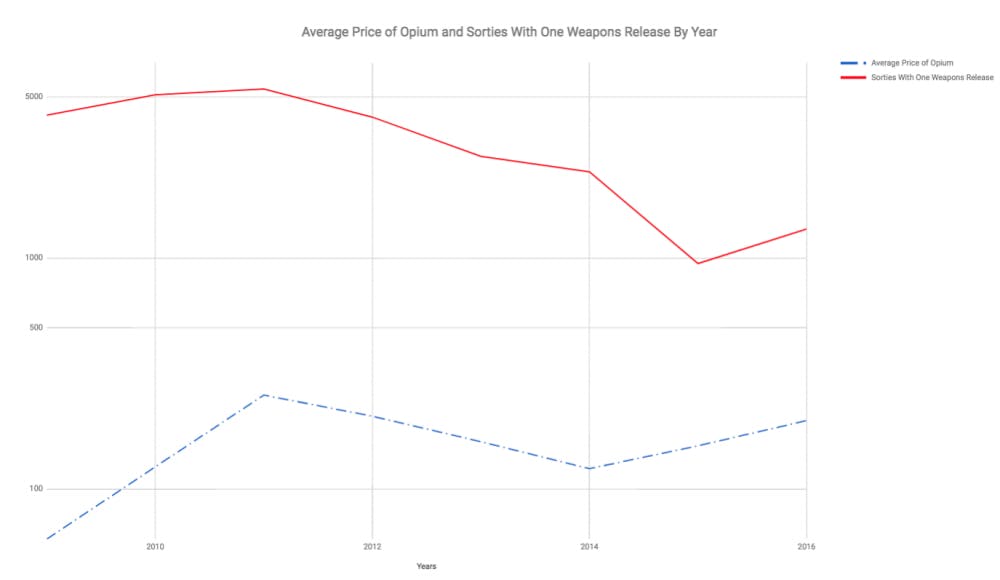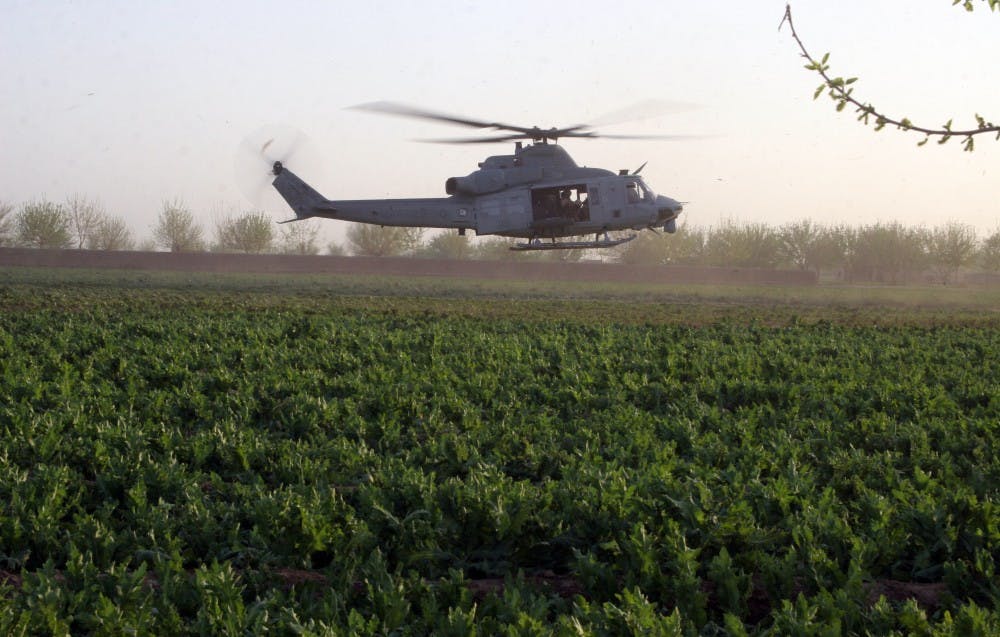As the Trump administration moves forward on its plan of deploying yet more troops into Afghanistan, we need to ask ourselves an important question, will this strategy finally win us the war? As I’ve written previously, simply building up and training the Afghan military into a more effective fighting force will not prove to be an effective strategy. Sure, they will kill more insurgents, but, as past conflicts have made evident, simply killing more insurgents will not win you the war.
The Vietnam War, notably, was lost because the U.S. cared more about increasing the enemy body count than dealing with the systemic issues that allowed the enemy to continue to raise troops up to replace their dead. Our current strategy for Afghanistan will suffer the same pitfalls if we do not learn from history.
So if our current strategy won’t work, what are we to do? The answer is surprisingly simple: Go after the opium.
Afghanistan is, in many ways, a narco-state. Narco-states are “an area or government that is involved with drug trafficking directly or indirectly.” By this metric, Afghanistan certainly qualifies. Afghanistan produces roughly 90 percent of the world’s opium, the main ingredient in heroin and morphine. This opium is generally produced by farmers and then sold in markets to traffickers and smugglers, many of whom are affiliated with the Taliban. The farmers, traffickers and smugglers alike all pay taxes on the production of opium, the sale of the product, the protection of crops and transportation to market and out of the country.
Every year, the Taliban brings in roughly $400 million from this illicit trade, funding their ever increasing presence in the war-torn nation. It's not just taxes either. The same traffickers and smugglers that bring the product to market and out of the country also help the Taliban acquire weapons and munitions.
This opium trade is an essential part of what keeps the Taliban functioning despite 16 years of hellacious fighting. No matter how many causalities they took, no matter how much territory they lost, the Taliban has continued to be an existential thorn the government’s side. This opium helps fund Taliban recruitment and arms purchases, allowing them to bounce back from whatever is thrown at them. Clearly, to take down the Taliban, we must go after the opium. This, however, is easier said than done.
Under both the Bush and Obama administrations, opium in Afghanistan was treated as a relative non-issue. With a strategy of keeping a "light footprint" in-country, cooperation with local strong-men, warlords and power-brokers became essential. Part of the problem, however, was that these same stakeholders were as deeply involved in the opium trade as the Taliban. Corruption was rampant and the U.S. turned a blind eye to opium in the hopes of getting these figures to support the nascent and struggling Afghan national government.
Token effort was put into curbing the opium trade, focusing mainly on manual crop destruction, an extremely time-consuming and frustratingly difficult process. It achieved little. As a result, opium production blossomed, even in government-held areas where the trade is ostensibly illegal. Currently, the opium trade comprises over 20 percent of the country’s GDP.
With the Taliban on the rise, it's time we started taking the opium trade seriously. It's evident that no matter how many insurgents we kill, the group will replace them with no trouble at all using the money it makes off of this crop. To get across just how essential the opium trade is to the Taliban, I ran some numbers on the correlation between the intensity of violence in the country and the price of opium.
To measure intensity, I used “Sorties With One Weapons Release,” essentially, how many combat missions were flown that resulted in weapons use. For one, as the number of U.S. aircraft in-country has remained relatively stable throughout the conflict, the only real variation exists in how much these aircraft have seen combat action. Secondly, the amount of combat these aircraft have seen varies based on the intensity of the conflict.
Calling in an air asset to bomb a target is no small matter — these aircraft and their payload are enormously expensive and there are only a limited number of them. Therefore, when they see combat, it's generally in support of higher-risk ground engagements, eliminating high value targets or supporting troops that are in danger. Put more simply, these aircraft are more likely to see combat the higher intensity the combat is. Utilizing this metric, we can take into account the intensity of our conflict with the Taliban.
The price of opium is far easier to parse out. The United Nations Office on Drugs and Crime monitors the production and sale of opium in Afghanistan, giving us a good idea of how much opium sells for in markets all across the country.
After running a statistical analysis of the data, the positive correlation between intensity of conflict and the price of opium became evident and startling. As the price of opium increases in Afghanistan, the more conflict generally occurs. When the price drops, so does the violence. This tells us that possibly our only chance of success in fighting the Taliban exists in curbing the production and sale of opium.

This is not the most original idea; others have thought of it before. However, what these plans get wrong is just how fundamentally tied into Afghanistan opium is. Sure, it sounds easy to just eliminate crops from the air with defoliating agents or to increase the economic prospects of farmers by investing in the development of the country. Neither of these ideas has any long-term prospects of success. Destroying crops only turns the farmers against us — these crops are their livelihood, possibly their only way to survive in one of the poorest nations on earth. Board development won’t work either. Substantial development takes a long time to come to fruition and we don’t have that kind of time in this war. Instead, I offer a third way: Buy the crops.
Buying the crops at above market price, as opposed to destroying them or praying for long-term development plans to pay off, offers an immediate solution to the problem of opium. Farmers will be offered a massive economic incentive and state protection for something they were going to do regardless. Furthermore, it deprives the Taliban of the income it needs to feed its war machine. After buying as much opium as we can, before the next growing season starts, we can offer farmers yet another economic solution — switch to other crops that the government will buy, again, at above market value.
In doing this, the economic benefits of opium will no longer exist. Farmers will operate within the legal market and will no longer have to worry about a stable income due to the legal uncertainty surrounding opium in Afghanistan. To ensure this plan finds success, punishment must exist for farmers unwilling to cooperate. In this case, the destruction of crops would be an excellent solution to coerce farmers into an agreement with the government that will ultimately be beneficial to both parties.
In the end, it will be opium, not casualties, that makes or breaks the U.S. struggle in Afghanistan. This long-overlooked problem will not go away without swift and decisive action. Failure to do so will only result in more caskets, more funerals and more 21-gun salutes. It will help with our other big battle back home too: an opioid crisis fueled in part by cheap Afghan opium. A change in strategy is essential to our success in Afghanistan; a failure to realize this will only prolong our drug-induced nightmare.

